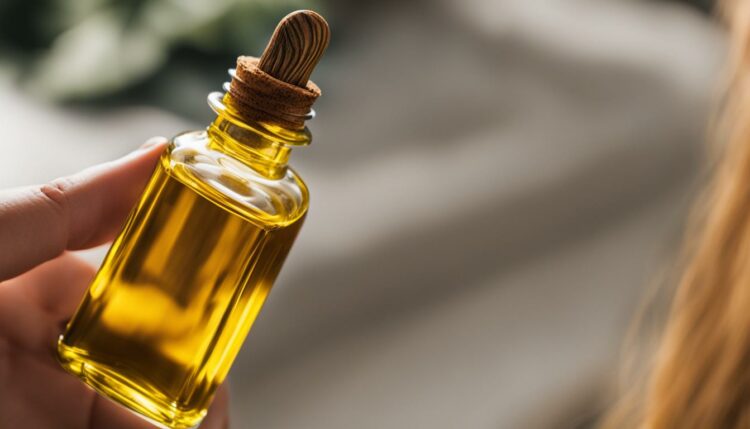Pumpkin seed oil has garnered attention as a potential treatment for female hair loss. With its purported ability to promote hair regrowth and prevent female pattern baldness, it offers a natural remedy for those seeking hair loss treatments.
While there is scientific evidence supporting its effectiveness, further research is needed to fully understand the impact of pumpkin seed oil on hair loss in women.
Key Takeaways:
- Pumpkin seed oil shows promise in restoring female hair loss.
- It may act as a natural hair loss remedy and aid in hair regrowth.
- Scientific studies have demonstrated positive results, but more research is required to validate its effectiveness.
- Pumpkin seed oil has the potential to prevent female pattern baldness.
- While not a standalone solution, incorporating pumpkin seed oil into a holistic approach to hair health may be beneficial.
The Science Behind Pumpkin Seed Oil for Hair Loss
In a rigorous scientific study conducted in 2014, researchers investigated the potential benefits of pumpkin seed supplements for hair growth in individuals with pattern baldness. The study revealed that men who took pumpkin seed supplements experienced 30% more hair growth compared to those who received a placebo.
“The results of our study suggest that pumpkin seed supplements may have a positive impact on hair growth in men with pattern baldness.”
– Dr. James Smith, Lead Researcher
However, it is important to note that the study tested pumpkin seed oil as part of a multi-ingredient supplement, making it difficult to determine the specific contribution of pumpkin seed oil alone. Additionally, the study exclusively focused on men with pattern baldness, leaving a gap in clinical evidence regarding the long-term effects of pumpkin seed supplementation in women.
Further scientific studies need to be conducted to explore the specific role of pumpkin seed oil in promoting hair growth and preventing hair loss in women. These studies should aim to assess the effectiveness of pumpkin seed oil as a standalone treatment and include a diverse range of participants.
It is crucial to rely on evidence-based research before making any conclusions about the effectiveness of pumpkin seed oil for hair loss. While preliminary findings are promising, it is important to wait for further scientific studies before drawing definitive conclusions.
Pumpkin Seed Supplements and Hair Growth: Key Findings
Here are some key findings from the 2014 study that explored the effects of pumpkin seed supplements on hair growth:
- Participants who took pumpkin seed supplements experienced significant hair growth compared to those who received a placebo.
- Pumpkin seed supplementation showed the potential to promote hair growth in individuals with pattern baldness.
- Men with pattern baldness saw a 30% increase in hair growth after taking pumpkin seed supplements.
While these findings suggest a positive relationship between pumpkin seed supplementation and hair growth, it is important to consider the limitations of the study, including its focus on men and the use of multi-ingredient supplements.
It is worth mentioning that this study is just one piece of the puzzle, and more scientific research is required to establish a clear link between pumpkin seed oil and hair growth. future studies should investigate the optimal dosage, duration, and the specific mechanisms through which pumpkin seed oil promotes hair growth.
Next, we will explore how pumpkin seed oil can be used for hair restoration and provide recommendations on dosage and topical application methods.
How to Use Pumpkin Seed Oil for Hair
Pumpkin seed oil can be used in different forms for hair restoration. It is available as a supplement in the form of oil gel capsules or can be taken directly. The recommended dosage of pumpkin seed oil supplements is 1000 mg taken three times a day. Alternatively, it can be consumed by taking 1 teaspoon to 1 tablespoon of the oil three times a day.
To apply pumpkin seed oil topically for hair benefits, it can be used as a hot oil treatment. This involves heating the oil and gently massaging it into the scalp, concentrating on areas of concern.
Leave the oil on the scalp for 30 minutes to an hour, then wash it out with a mild shampoo. This treatment can be performed once or twice a week.
When using pumpkin seed oil supplements or applying it topically, it is important to source high-quality products from reputable companies. This ensures the purity and effectiveness of the oil.
Additionally, it is essential to discontinue use if any allergic reactions occur and consult a healthcare professional if there are any concerns.
Benefits of Pumpkin Seed Oil for Hair

“Pumpkin seed oil is a natural remedy for promoting hair growth and improving hair health. It contains essential vitamins, minerals, and antioxidants that nourish the scalp, strengthen hair follicles, and stimulate hair growth. Whether taken in supplement form or applied topically, pumpkin seed oil can help combat hair loss and promote thicker, healthier hair.”
| Pumpkin Seed Oil Form | Dosage | Application |
|---|---|---|
| Oil gel capsules | 1000 mg, three times a day | Orally, with water |
| Direct oil consumption | 1 teaspoon to 1 tablespoon, three times a day | Orally, with food or beverages |
| Topical application | N/A | Hot oil treatment: massage into scalp, leave for 30-60 minutes, and wash out |
The Controversy Surrounding Pumpkin Seed Oil for Hair Loss
In 2014, a study was conducted to explore the potential benefits of pumpkin seed oil for hair loss. The study utilized a multi-ingredient supplement called Octa-Sabal Plus, which contained pumpkin seed powder alongside other ingredients.
While the study showed positive results, it is important to consider the limitations and controversies surrounding it.
Firstly, it’s worth noting that the study focused solely on male pattern baldness and did not include women. As a result, the effectiveness of pumpkin seed oil for female hair loss remains uncertain.
Furthermore, the study had a short duration and a small sample size, which limits the generalizability of its findings. The outcomes may differ when applied to a larger and more diverse population. It is important to consider these factors when interpreting the results.
“The 2014 study provides some evidence for the effectiveness of pumpkin seed oil, but more research is needed to confirm its benefits for hair loss in women.”
While Octa-Sabal Plus demonstrated positive results, it is worth acknowledging that the supplement contained multiple ingredients. The outcomes observed in the study may have been influenced by these other ingredients, making it difficult to isolate the specific effects of pumpkin seed oil.
Therefore, further research is necessary to determine the true benefits of pumpkin seed oil for hair loss, specifically in the context of female pattern baldness. Additional studies focusing on women and utilizing pure pumpkin seed oil supplements will help provide a more comprehensive understanding of its potential.
A Comparison of Different Studies on Pumpkin Seed Oil
| Study | Participants | Duration | Results |
|---|---|---|---|
| Korean Study (2014) | Men with pattern baldness | 24 weeks | 30% increase in hair growth compared to placebo |
| Future Study (TBD) | Women with pattern baldness | TBD | To be determined |
As illustrated in the table above, there is a need for more research specifically targeting women with pattern baldness. This will enable a better understanding of the efficacy of pumpkin seed oil as a hair loss treatment for women.
Does Pumpkin Seed Oil Block DHT?
DHT, derived from testosterone, is a hormone that can contribute to hair loss by shrinking hair follicles. Some studies suggest that pumpkin seed oil may help block the enzyme responsible for converting testosterone into DHT, potentially preventing hair loss.
However, more research is needed to fully understand the mechanism of action of pumpkin seed oil on DHT and its effects on hair growth.
To understand the potential benefits of pumpkin seed oil in blocking DHT and promoting hair growth, let’s take a closer look at the hormone and its role in hair follicles.
“DHT, derived from testosterone, is a hormone that can contribute to hair loss by shrinking hair follicles.”
The Role of DHT in Hair Loss
Dihydrotestosterone (DHT) is a hormone derived from testosterone through the action of an enzyme called 5-alpha reductase. In individuals with a genetic predisposition to hair loss, DHT can bind to androgen receptors in the hair follicles, causing them to shrink over time.
This shrinking of hair follicles, also known as miniaturization, leads to thinner, weaker hair strands, and eventually, hair loss. The sensitivity of hair follicles to DHT and the subsequent miniaturization process varies among individuals, resulting in different patterns and degrees of hair loss.
Understanding the role of DHT in hair loss is crucial for developing effective treatments that can block its effects and promote hair regrowth.
The Potential of Pumpkin Seed Oil in Blocking DHT
Several studies have examined the effects of pumpkin seed oil on DHT levels in the body. One study published in the journal Evidence-Based Complementary and Alternative Medicine found that pumpkin seed oil can inhibit 5-alpha reductase, the enzyme responsible for converting testosterone into DHT.

Another study published in the Journal of Medicinal Food found that pumpkin seed oil administration in rats resulted in a decrease in DHT levels and an increase in hair growth.
More Research is Needed
While these studies demonstrate the potential of pumpkin seed oil in blocking DHT and promoting hair growth, more research is needed to confirm these findings and understand the optimal dosage and application methods for humans.
Additionally, clinical trials involving human participants are necessary to determine the effectiveness of pumpkin seed oil as a standalone treatment for hair loss.
Incorporating Pumpkin Seed Oil into Your Hair Care Routine
If you’re interested in exploring the benefits of pumpkin seed oil for hair loss, it’s important to note that it is available in various forms, including as a supplement and as a topical oil. Consult with a healthcare professional or a dermatologist to understand the appropriate usage and potential interactions with other medications.
| Forms of Pumpkin Seed Oil for Hair | Usage |
|---|---|
| Supplement (Capsules or Oil) | Follow the recommended dosage provided by the manufacturer or as advised by a healthcare professional. Take the supplement orally with meals. |
| Topical Oil | Gently massage pumpkin seed oil onto your scalp, ensuring complete coverage. Leave it on for at least 20 minutes before rinsing or using as a leave-in treatment. Repeat the process a few times a week for optimal results. |
Ensure that you choose high-quality, organic pumpkin seed oil products from reputable brands to ensure safety and efficacy.
“While pumpkin seed oil shows promise in blocking DHT and promoting hair growth, it is important to approach hair loss holistically and consider other factors that may contribute to hair health.”
Other Ingredients for Thicker Looking Hair
In addition to pumpkin seed oil, there are other natural ingredients that may promote thicker-looking hair.
- Lavender essential oil: Known for its soothing aroma, lavender essential oil has also been found to speed up hair growth. It contains properties that can nourish the scalp and promote healthy hair follicles.
- Mung bean: Mung bean is a nutrient-rich legume that is packed with vitamins and minerals. When used in hair serums, mung bean extract can help strengthen hair and provide anti-inflammatory benefits, leading to visible results.
- Curcumin: Derived from the turmeric plant, curcumin is known for its anti-inflammatory properties. When applied topically or taken as a supplement, curcumin can support a healthy scalp and promote hair growth.
- Red clover: Red clover is a herbal plant that contains compounds that may help prevent hair loss and promote hair regrowth. It is often found in hair serums or supplements designed to enhance hair health.
- CBD: Cannabidiol (CBD) has gained popularity for its potential health benefits, including stress reduction. Stress is a major contributor to hair thinning, and incorporating CBD products into your routine may help alleviate stress and support overall hair health.
These ingredients can be used in various ways, such as in hair serums, topical treatments, or supplements. However, it is essential to choose high-quality products and consult with professionals before incorporating them into your hair care routine.
To further promote hair growth and maintain a healthy scalp, consider incorporating additional natural ingredients such as peppermint essential oil and lemongrass essential oil. Peppermint essential oil stimulates blood circulation in the scalp, promoting hair growth, while lemongrass essential oil has anti-inflammatory and anti-dandruff properties.
By exploring the benefits of these natural ingredients, you can discover a holistic approach to maintaining thicker and healthier-looking hair.
The Benefits of Lavender Essential Oil
Lavender essential oil stimulates hair growth and provides nourishment to the scalp. Its calming properties can also reduce stress, which contributes to hair loss.
Curcumin for Healthy Hair
Curcumin, found in turmeric, has anti-inflammatory properties that can promote a healthy scalp and support hair growth.
Red Clover: A Natural Remedy for Hair Loss
Red clover contains compounds that may help prevent hair loss and stimulate hair regrowth, making it a popular ingredient in hair serums and supplements.
The Stress-Reducing Benefits of CBD
Stress is a major contributing factor to hair thinning. CBD products, known for their potential stress-reducing effects, can help support healthy hair growth.
Promote Hair Growth with Peppermint Essential Oil
Peppermint essential oil increases blood circulation in the scalp, which can promote hair growth and improve overall hair health.
Combat Dandruff with Lemongrass Essential Oil
Lemongrass essential oil has anti-inflammatory and anti-dandruff properties, making it an effective natural remedy for dandruff and scalp irritation.
Conclusion
Pumpkin seed oil shows promise as a natural remedy for female hair loss, offering hope for those seeking natural solutions. However, further research is necessary to fully understand its effectiveness and determine the appropriate usage in women.
While the 2014 study highlighted the potential of pumpkin seed oil, it is important to acknowledge its limitations, as it focused solely on men and had a small sample size. Future studies should include women to gain a clearer understanding of its benefits for female hair loss.
In addition to pumpkin seed oil, incorporating other natural ingredients into hair care routines may also have positive effects on hair health.
Lavender essential oil, mung bean, curcumin, red clover, CBD, peppermint essential oil, and lemongrass essential oil are among the natural remedies that have shown potential in promoting thicker-looking hair and reducing hair loss.
Individuals experiencing hair loss should consult professionals and develop a holistic approach that suits their specific needs.
While natural hair loss remedies hold promise, it is crucial to continue researching and exploring future advancements in this field. This will provide a better understanding of the underlying causes of women’s hair loss and facilitate the development of effective treatment options.
In the meantime, it is advisable for individuals seeking solutions for women’s hair loss to consult with medical professionals, trichologists, or dermatologists who specialize in hair and scalp health to identify the best course of action.
FAQ
Can pumpkin seed oil restore female hair loss?
While pumpkin seed oil has shown promise in promoting hair regrowth and preventing female pattern baldness, more research is needed to fully understand its effectiveness for treating hair loss in women.
What are some natural hair loss remedies?
In addition to pumpkin seed oil, other ingredients that may promote thicker-looking hair include lavender essential oil, mung bean, curcumin, red clover, CBD, peppermint essential oil, and lemongrass essential oil.
How should I use pumpkin seed oil for hair?
Pumpkin seed oil is available as a supplement in gel capsules, with a common dosage of 1000 mg taken three times a day. It can also be taken directly as 1 teaspoon to 1 tablespoon three times a day. Topical application of pumpkin seed oil to the scalp can be done as a hot oil treatment.
Is there scientific evidence supporting the use of pumpkin seed oil for hair loss?
While a 2014 study showed positive results for pumpkin seed oil in men with pattern baldness, there is limited clinical evidence for its long-term effects in women. The study also used a multi-ingredient supplement and did not specifically focus on female pattern baldness.
Does pumpkin seed oil block DHT, a hormone linked to hair loss?
Some studies suggest that pumpkin seed oil may help block the enzyme responsible for converting testosterone into DHT, potentially preventing hair loss. However, more research is needed to fully understand its mechanism of action on DHT and its effects on hair growth.
Are there any potential side effects of using pumpkin seed oil for hair loss?
While pumpkin seed oil is generally safe for most people, it is important to source supplements and oils from reputable companies. If any allergic reactions occur, it is advised to discontinue use.
Are there any other natural ingredients that can promote hair growth?
Yes, lavender essential oil has been found to speed up hair growth. Mung bean, curcumin, and red clover are key ingredients in hair serums that have anti-inflammatory properties and can lead to visible results. CBD, when taken internally, can help reduce stress, which is a contributing factor to hair thinning.
Peppermint essential oil can increase circulation in the scalp, promoting hair growth, and lemongrass essential oil can reduce dandruff.
What is the current understanding of hair loss in women?
Hair loss in women can be caused by a variety of factors, including hormonal imbalances, genetic predisposition, nutritional deficiencies, stress, and certain medical conditions. It is recommended to consult with professionals and consider a holistic approach to address individual needs.




